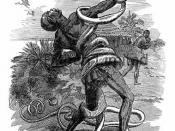A fair answer to this question requires a review of imperialism and the associated notions of prejudice and racism. Completeness also depends upon understanding the setting of Heart of Darkness: the region now called the Democratic Republic of the Congo in the period around 1900. A version of Conrad's work first appeared in the Blackwood's Magazine in 1899, but was published as a novella in 1902.
Imperialism is the political theory of the acquisition and maintenance of large, multi-ethnic states held together by coercion. This model is typified by the ancient empires of Rome and Greece. Subject states were conquered and integrated de facto into the empire. For example, Rome itself effectively became larger with the incorporation of a new state. In the latter half of the 19th century, European countries undertook imperialism in Africa and Asia under a different model, that of colonisation. Colonies were de jure subordinate to the imperial state, rather than de facto as in earlier empires.
Colonies remained outside the borders of the empire state and retained some identity but were especially under economic control of the empire.
The rapid colonisation of the "dark continent" by European powers between 1880 and 1914 is known as the Scramble for Africa. It was driven by economic exploitation on a huge scale; indeed in Leninist economic theory the term imperialism is used to describe the highest form of capitalism. Even in this frenzy for wealth however, the history of the Congo basin is exceptional.
The Congo Free State was ruled between 1885 and 1908, not by the state of Belgium, but as a private kingdom owned by King Leopold II of Belgium. The Belgian government had repeatedly refused to support Leopold's colonial ambitions; his suggestions were variously to colonise Borneo, the Philippines or establish dependencies in China,


